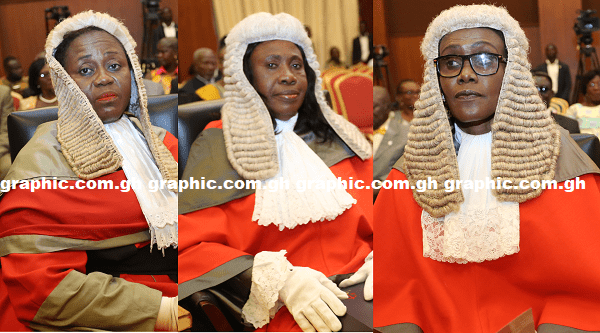
Bastardisation of Judiciary must stop
In any society, disputes must be settled by an independent body, in accordance with the principle of the rule of law.
The rule of law implies that all individuals are subjected to the same law. The principal role of the Judiciary is to protect the rule of law and ensure the supremacy of the law.
Article 125 of the 1992 Constitution stipulates that justice emanates from the people, and it shall be administered by the Judiciary, which shall be independent and subject only to the Constitution.
This constitutional provision can be explained to mean that the Judiciary is independent but must act in the interest of the people of Ghana. Again, it could also mean that although the Judiciary is independent and subject only to the Constitution, it is not immune to criticisms by the people from whom justice emanates.
Criticism of judges and the body enshrined with the power to administer justice has always been part of human existence.
It is, therefore, perfectly in order when people criticise judges or disagree with their decisions. In fact, one of the common forms of criticism against judges is appeal. Whenever a party appeals against the decision of a judge, the party is in fact criticising the judge.
However, the Daily Graphic has observed with concern recent rhetoric and statements by notable persons who have taken the Judiciary to the cleaners and denigrated it, all in the name of criticism.
The innuendos and suggestive comments by these persons that the Judiciary has been compromised, without any justification or evidence, do not augur well for our democracy and our quest to build a society based on freedom and justice.
To suggest that the Justices of the Supreme Court, the highest court of the land and custodians of the Constitution, think alike and are always in agreement to champion the cause of a certain group is not only below the belt but also has the tendency to reduce the confidence people have in our Judiciary, which can negatively affect our democracy.
This is more serious when such statements are not backed by any evidence and are thrown into the public space, to be consumed by some people as the Gospel truth.
At this year’s annual general meeting of the Association of Magistrates and Judges of Ghana (AMJG), the Chief Justice, Justice Kwasi Anin Yeboah, went to great length to explain the dangers of vilifying the Judiciary and judges.
According to him, unjustified criticism of judges posed a great danger to our democracy, as it could lead to a loss of confidence in the Judiciary. The Daily Graphic associates itself with the Chief Justice’s sentiments and adds that the loss of confidence in the Judiciary as a result of these baseless and unjustified criticisms goes beyond the shores of this country.
No investor will be willing to invest money in a country that is portrayed as having a compromised Judiciary. Perception or not, if we are not careful, we will end up devaluing this country in the eyes of the international community if influential people continue to denigrate the Judiciary.
Again, people will be unwilling to resort to the courts to resolve their disputes because they have been made to believe that the Judiciary has been compromised and does not administer justice fairly. The anarchy such a situation will cause can affect our very existence as a nation.
At the AMJG event, the Chief Justice made a profound statement to the effect that the Judiciary was not above criticism, and that, in fact, it needed criticism to develop, but what was required was fair and constructive criticism and not verbal threats and threats of physical attacks on judges.
In this regard, such innuendos and comments suggesting that judges are compromised without any shred of evidence pose a danger to the safety of judges.
Let us not forget one of the darkest days in the history of this country — June 30, 1982 — when three Justices of the High Court and a retired Army officer were gruesomely murdered. We have come far as a democracy and must, therefore, not countenance anything, including rhetoric, that could put our judges in danger.
Criticism of judges must be based on application of the law by judges, not on their personality.
The Daily Graphic calls on all to be free to criticise judges whenever they deem fit, but such criticism must be justified, constructive and fair and not meant to bring the administration of justice into disrepute.
